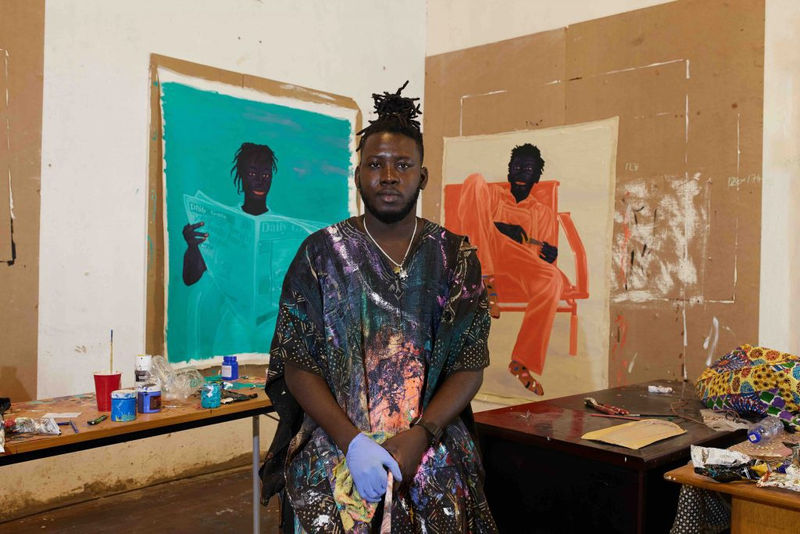Naomi Rea for Artnet
We caught up with the Ghanaian artist on the art supplies, snack food, and vibes that keep his studio running.
Kwesi Botchway is taking a moment to step back. The Ghanaian artist, along with fellow painters Amoafo Boako and Otis Kwame Kye Quaicoe, is celebrating the opening of a new group exhibition at Gallery 1957 in Accra.
The artists came up together at the Ghanatta College of Art and Design, and are now at the vanguard of a new generation of West African painters. Botchway is known for his romantic figurative paintings, and a signature deep purple palette that lends a quality of otherworldliness to his subjects. The new work on view in the exhibition looks at contemporary ideas of Blackness and how they interact with West African cultural identities, and the wider human experience.
We caught up with Botchway on what supplies he needs to work, the snack foods that keep his studio running, and why he’s so drawn to human faces in works of art.
What are the most indispensable items in your studio and why?
My paint brushes and my purple paint—this is the basis of all my work.
What is the studio task on your agenda tomorrow that you are most looking forward to?
Tomorrow I actually have the day off as I’m celebrating the opening of “Homecoming” at Gallery 1957, my new exhibition with my brothers Amoako Boafo and Otis Kwae Kye Quaicoe. It’s an important moment for us. We’ve all had amazing years and it’s so exciting to see where their careers are going, but it has meant we’ve been able to spend less time together.
“Homecoming” represents a moment for us all to step back and take a look at what we’ve achieved—separately, but together. It also coincides with Gallery 1957’s fifth anniversary, so there’ll be wider celebrations to be had too. I think it’s important to take some time to celebrate. Once I’m back in the studio I’ll mainly just be looking forward to picking up the paintbrush and creating again.
What kind of atmosphere do you prefer when you work? Do you listen to music or podcasts, or do you prefer silence? Why?
I like a bit of music. I’ve been listening a lot to Chronixx lately.
What trait do you most admire in a work of art? Which do you most despise?
I’ve always been really drawn to the human face in artworks. This is where we express our emotions, and I think the crux of what the artist is trying to achieve rests here. Whether it’s a work by a French Impressionist or an African realist painter, I’ll be looking straight toward the face to see how the artist has portrayed their sitters, and their own feelings, through the work’s expression.
What snack food could your studio not function without?
Cashews!
Who are your favorite artists, curators, or other thinkers to follow on social media right now?
Apart from Otis and Amoako, definitely Ekow Eshun, who was influential in working with me on my debut London show last year. Also my friend, the artist Jenny Bastet.
What is the last exhibition you saw (virtual or otherwise) that made an impression on you?
When I was in London I was lucky enough to catch Toyin Ojih Odutola at the Barbican and Lynette Yiadom Boakye at Tate Britain. Both were amazing examples of how international artists are reframing Black narratives within the art-historical canon.
If you had to put together a mood board, what would be on it right now?
My mood board is social media really – it’s where I get so much of my inspiration and even come up with some of my subjects.

